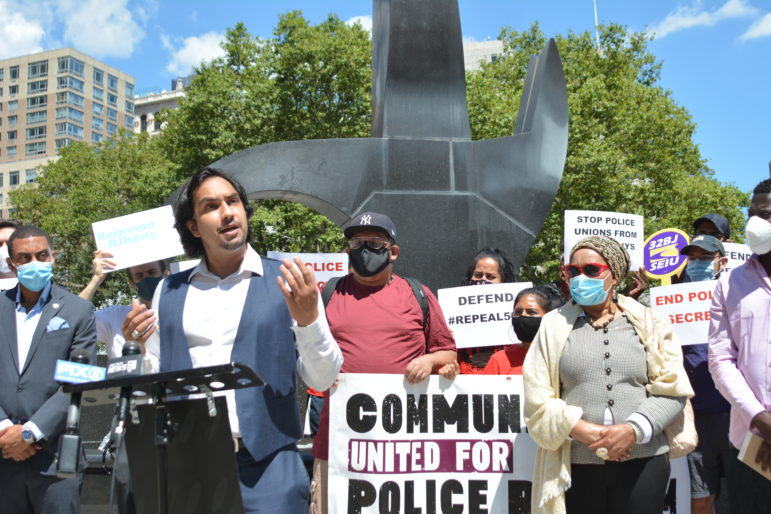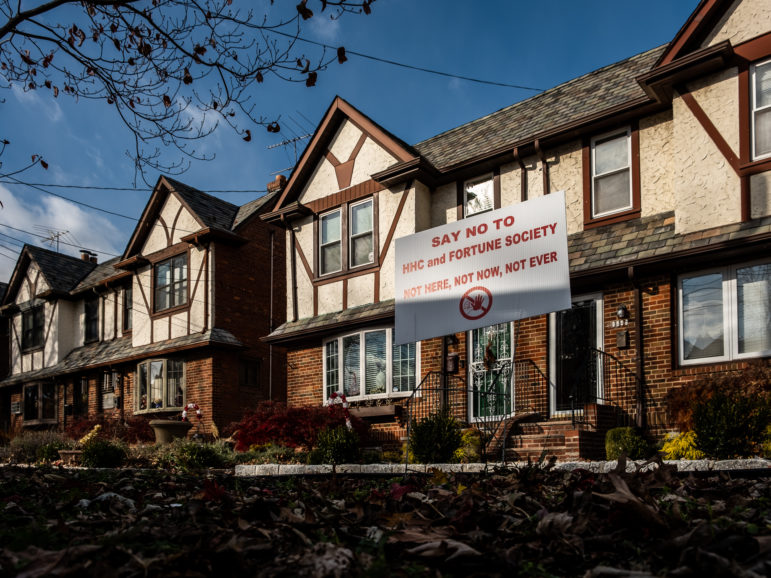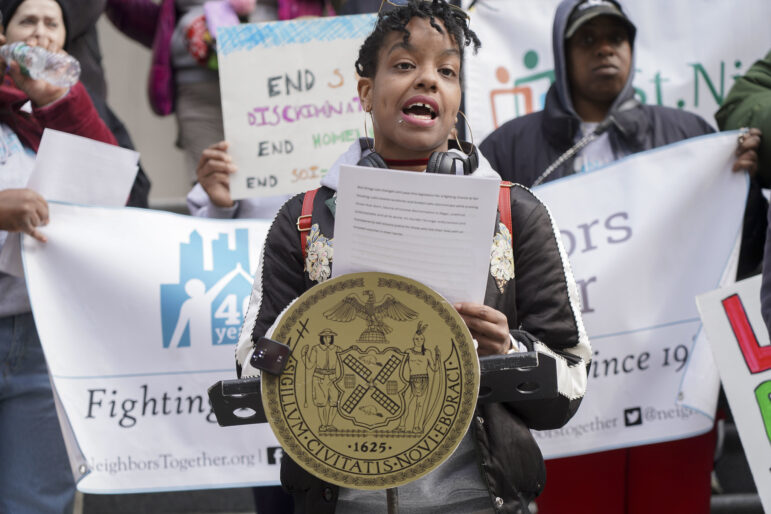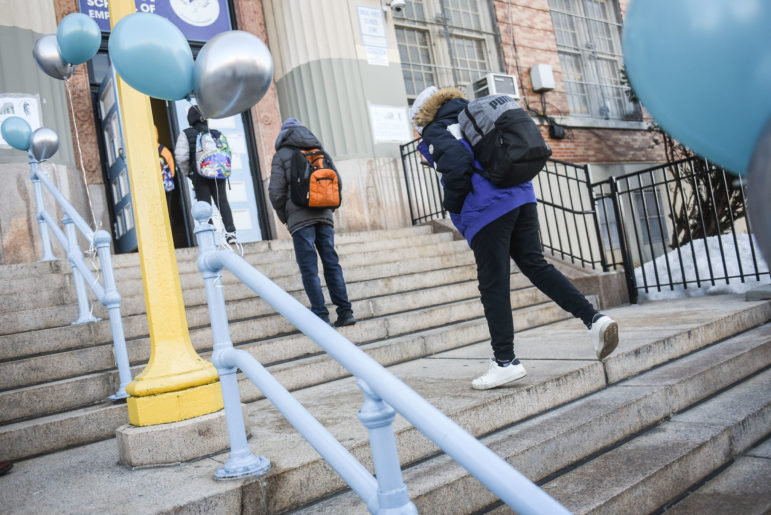Janos Marton’s plan would pump $50 million a year to community-based providers in hopes of keeping people with mental illness out of police cars, courthouse lockups and jail cells.

Courtesy of Janos Marton
Janos Marton, one of several candidates vying to be the next Manhattan district attorney.Revelations about the abysmal treatment of mentally ill detainees created the political tide that is sweeping Rikers Island to the dustbin of history. As inmate counts have generally dropped in recent years, however, mental illness has grown increasingly present in city jails. Forty-five percent of people in city custody in fiscal year 2019 had a mental-health diagnosis, and 16.8 percent had a serious one–rates that have climbed in recent years.
On Tuesday a candidate for Manhattan district attorney unveiled a sweeping plan to change how mental illness is handled by cops, courts and corrections agencies. And he says he’s found a way to pay for it: the forfeiture money that prosecutors seize from financial institutions that run afoul of the law.
“The Manhattan DA’s office generates significant forfeitures through its investigations into illegal conduct by financial companies,” Janos Marton writes in a white paper. “Rather than waste these funds on paying for police expansion, I will use virtually all financial resources our office obtains from these forfeitures to fund community-based mental health programs.”
Marton is not the only DA candidate talking about the need to better address mental health. Diana Florence has called for “first response teams that exclude law enforcement and that are deployable by a dedicated emergency number” and “the establishment of diversion centers where people in mental health crises can be transported instead of detention or hospital emergency rooms.” Lucy Lang says she will impose “an explicit policy of declining to prosecute homelessness-related offenses, poverty-related offenses, and nonviolent crimes linked to substance abuse and/or mental health needs.” Tahane Aboushi and Eliza Orlins have vowed to stop prosecuting offenses linked to mental-health problems.
For his part, the incumbent DA, Cy Vance, launched Manhattan’s first Mental Health Court in 2011, and contributed $40 million of forfeiture funds to Mayor de Blasio’s 2014 program targeting mental health in the criminal-justice system.
Marton, a lawyer who most recently worked for the ACLU but earlier ran the Close Rikers campaign, is arguing for a different approach to those courts and larger financial commitments.
The need for a different approach to handling mental illness is written in budgets and blood. Jailing or imprisoning people who commit crimes largely because of untreated mental illness is a very expensive, poorly-targeted approach. Several policing killings over the years have involved people with mental illness.
In its 2014 probe of Rikers Island, the U.S. attorney found that, “Adolescent inmates, many of whom have mental illnesses, are routinely placed in what amounts to solitary confinement for weeks and sometimes months at a time” and ordered the city to “Develop alternative disciplinary strategies that do not involve lengthy isolation, and prohibit the placement of adolescents with mental health disorders in solitary confinement,” a directive on which the city did make some progress.
In the 2017 report that recommended the closing of Rikers Island, the Lippman Commission called for the city to “find alternative locations, outside of the borough jails, where incarcerated people who have serious mental illness or other serious medical conditions can receive treatment in a secure
but therapeutic environment.” Last year, the de Blasio administration announced a plan to create secure units at public hospitals for people in custody who have serious mental illnesses.
Yet much of the problem with how the criminal justice system handles mental illness occurs upstream of the jail system: in how police respond to mentally-ill people, the decision by law enforcement officials and prosecutors to treat outward manifestations of mental illness as criminal acts, and the lack of resources to treat mental illnesses before they morph into public-safety concerns.
Marton’s campaign paper calls for spending $50 million in forfeiture money each year on community-based mental-health services—with the recipients determined by an outside panel of health experts and community members. That money might support programs that combine housing with mental-healthcare, offer peer support or partner schools that train mental-health professionals and students with government or nonprofit agencies that serve needy clients.
Marton also called for a non-911 three-digit number for emergency mental-health assistance and for the formation of response teams “composed of a paramedic, social worker, a psychiatric expert, and peer support who work in the triple shift model, ensuring someone is always able to respond” to emergencies as quickly as other first responders. He would expand eligibility for the mental-health court by considering all charges, not just non-violent felonies, and by working to eliminate the requirement that defendants plead guilty before they can go before the specialized court—all with the aim of keeping people with mental illness out of the jail system.
“There is absolutely no reason the city should be spending hundreds of millions of dollars to lock up people who need treatment, not incarceration, especially when we find ourselves in a desperate fiscal crisis,” Marton argues.
Inevitably, even with aggressive reforms, some people with mental illness will end up in state prison. Marton says he will instruct prosecutors to recommend that those defendants be incarcerated as close to their homes and families as possible, and work to end practices like solitary confinement that exacerbate the mental-health damage wrought by prison itself. He also plans to target mental-health services to people re-entering society from prison.
The primary for district attorney is just under seven months away and the large field—which includes Alvin Bragg, Liz Crotty, Dan Quart and Tali Farhadian Weinstein along with the candidates mentioned above, and of course the three-term incumbent, Vance—is pumping out substantive policy proposals and debating regularly. It is not the only large pool of candidates to form as the pivotal 2021 elections approach but, unlike the equally populous race for mayor, it will not feature ranked-choice voting.










One thought on “DA Hopeful Plans to Use Forfeiture Money to Fund Mental Health Services”
First of all, thank you for the information, and your perception. I could enjoy this
blog and especially this article. At this stage, Personally i think I misuse much too much time on-line,
reading junk, mainly. This is a refreshing differ from that experience.
Yet, I believe perusing other’s ideas is a very important investment of
at least some of my regular measure of time in my program.
It’s just like looking throughout the chaff to obtain the gold.
Or alternatively, whatever illustration performs best for you.
Still, near the personal pc is most likely as harmful to
you as cigarette smoking and deep-fried chips. http://behealthyforlife.org/